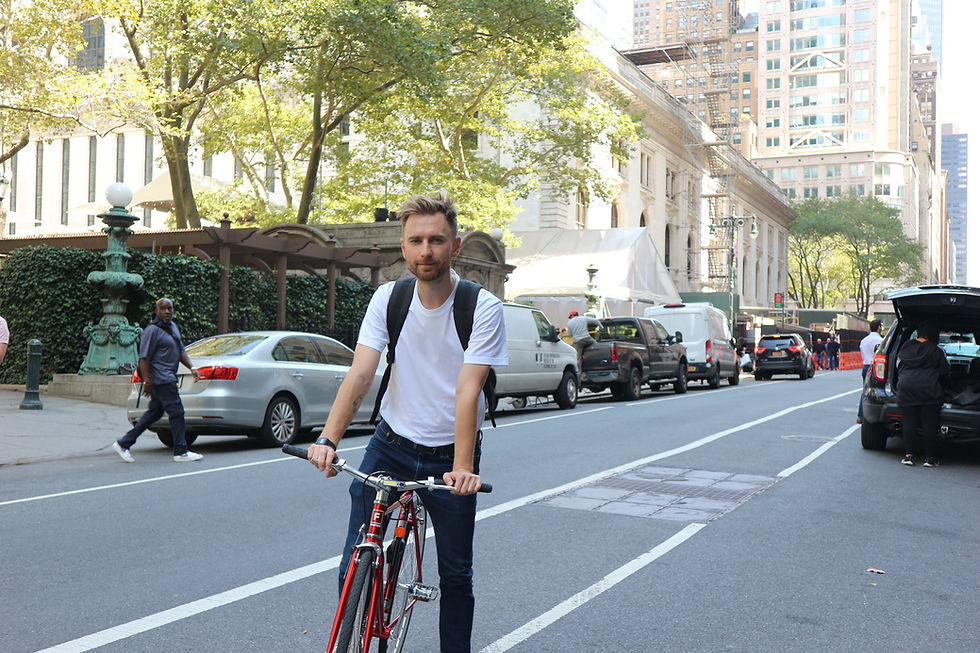Limitations for limitless: Karolis and his five things
- Khoa-Thu

- Sep 16, 2021
- 4 min read
Updated: Sep 17, 2021
Karolis Vyšniauskas is new in town. From a Baltic country of Lithuania with the total population of 2.8 million to New York - the US’s most populous city, Karolis talks about limitations and breakthroughs via five objects closely attached to him, personally and professionally.

I arrived in NYC in August with a luggage and a backpack – definitely a fresh start to me. I live in Brooklyn Heights – a stunning neighborhood on the other side of the bridge.

I was excited to get a bike and explore the city on two wheels. As NYC is quite flat, I just need a simple single-gear one.

I started keeping diary quite late in my life. My first entry was in 2019. It helps me to be emotionally healthier. This is also a kind of exercise when I go through a day and reflect on what I feel grateful from.

With my notes, I feel safer as it offers me a gateway to actively participate into lectures and stay focus. Of course, I can use my phone or computer. However, I am just not good at resisting distraction. When using notebooks, there is no option to check on something else. I like the limitation.

The tote bag I usually carry around is from a shop in Florida called Daddy Kool Records in which they sell vinyls and merchandise.
As a teenager, music became part of my life. In the age of Spotify, music becomes so present and easy to reach but I find hard to connect with it. Therefore, I would like to buy vinyls to have physical things that keep me more attached to music. Of course, vinyls are expensive and you need to get up from your bed to change sides.
However, just like using notebooks, all these limitations become a feature – a good thing actually.
I like the idea that one day I can pass my collection to someone who is interested in music, for example, my sister’s daughter.
I used to host two different radio shows – one with young people and the other with local Lithuanian musicians and artists. The idea was to promote and show the diversity of Lithuanian music to mass radio listeners who did not really know what was happening with the local music scene.
However, just like using notebooks, all these limitations become a feature – a good thing actually.

My career was different from many other journalists in Lithuania because I wanted to be a freelancer instead of going to find one place.
In Summer 2017, I joined the organization called NARA and started marking podcasts. At the time, no one was really doing podcasts in Lithuania and we got quite popular.
What I like about podcasts is that it can get people’s attention for much longer compared to video or written forms and you do not really need a lot of stuff to produce it.
When I am not in the studio, this microphone is what I use – simple but does a great job in reduce wind sound and record.

Spotify statistics shows that our audiences listen to the average of 80 percent of an episode despite the fact that each episode can be longer than an hour.
It’s not like you sitting on a couch and listening to a podcast. We listen to it when we do something else – riding a metro or going shopping, for instance.
In traditional radio, there is a certain way how you speak as a radio presenter. You always have to have what called “the radio voice”. In podcasting, your voices can sound different and people can relate to you because they find it natural.
What I like about podcasts is that it can get people’s attention for much longer compared to video or written forms and you do not really need a lot of stuff to produce it.

Threshold by Ieva Jusionyte is among few books I have brought to the US.
Jusionyte is an anthropologist growing up in Vilnius – the same city as mine – who had taught at Harvard for several years before moving to Brown. She did a research on first responders at the US-Mexico border.
One of our listeners who studied with her back in Vilnius she said “Look, she was my classmate in Vilnius and now she is doing this great stuff, you should contact her”.
I reached out to Jusionyte via Facebook and in the next summer when she went back home, we did an interview.
That was one of her first interviews in Lithuanian language.

Despite being a journalist, I cannot know everyone. Our listeners offer us much more contacts, ideas and people for our works. Lithuanian market is quite small so you will see the same person goes to different shows and talk about same things.
We, on the other hand, want to find completely new voices. I can see our listeners appreciate that effort.
NARA was one of the first sites in Lithuania to get funded via Patreon. Now we have more than 600 people who pay collectively around 2,500 euro per month on our works.
Of course, it was not enough for the whole team of six people but it is important because those money is directly from the listeners.
Despite being a journalist, I cannot know everyone. Our listeners offer us much more contacts, ideas and people for our works.




Comments